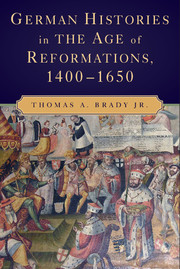Book contents
- Frontmatter
- Contents
- Figures, Maps, and Tables
- Acknowledgments
- A Note on Usages
- Map 1 The Empire in 1547
- Map 2 The Peace of Westphalia, 1648
- Part I The Empire, the German Lands, and Their Peoples
- Part II Reform of the Empire and the Church, 1400–1520
- Part III Church, Reformations, and Empire, 1520–1576
- Part IV Confessions, Empire, and War, 1576–1650
- Appendix
- Glossary
- Bibliography
- Index
Part IV - Confessions, Empire, and War, 1576–1650
Published online by Cambridge University Press: 05 June 2012
- Frontmatter
- Contents
- Figures, Maps, and Tables
- Acknowledgments
- A Note on Usages
- Map 1 The Empire in 1547
- Map 2 The Peace of Westphalia, 1648
- Part I The Empire, the German Lands, and Their Peoples
- Part II Reform of the Empire and the Church, 1400–1520
- Part III Church, Reformations, and Empire, 1520–1576
- Part IV Confessions, Empire, and War, 1576–1650
- Appendix
- Glossary
- Bibliography
- Index
Summary
The laws of God, therefore, are none but the laws of nature, whereof the principal is that we should not violate our faith, that is, a commandment to obey our civil sovereigns … who are therefore the supreme pastors, and the only persons whom Christians now hear speak from God – except such as God speaketh to, in these days, supernaturally.
Thomas HobbesThe Protestant reformers set out to reform churches; their disciples created confessions. Luther's revolutionary theology aimed to restore and did redraw relationships between the temporal and the spiritual realms in such a way that neither individual salvation nor the world's governance would be frustrated from achieving its respective object – the soul's reunion with God and the keeping of the world's peace. The key, so they believed, was the Church's submission to the Word in the form of true doctrine. Get this right, and – Satan's designs notwithstanding – the rest would fall into place. Whether because his tumultuous life left him no peace, or because he was a political innocent, Luther failed to work out in detail how the task should be accomplished. Each of his dicta for reordering a liberated Church's relationship to temporal authority preserved the stopgap character with which the reordering had begun.
Reflection on this outcome unveils a paradox: Martin Luther was the godfather of European Protestantism but not its creator.
- Type
- Chapter
- Information
- German Histories in the Age of Reformations, 1400–1650 , pp. 257 - 258Publisher: Cambridge University PressPrint publication year: 2009



